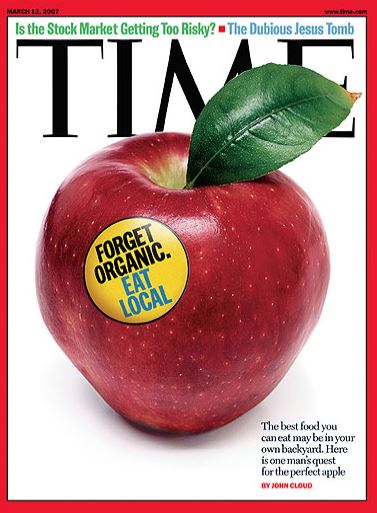Back in 2007, Time magazine ran the following cover announcing, in essence, that local was the new organic.
Well local, has arrived and now it seems it's time to move on to something else. Last night, I heard Randy Krotz, CEO of the US Farmers and Rachers alliance give a presentation, and as he talked he helped solidify some thoughts that have been rolling around in my head for a while.
In short, forget local, eat "plant based." "Plant based" appears to be the new local.
Randy must have been prescient because, as it turns out, right after his talk, my son (who graciously agreed to attend the meeting with me) and I decided to stop for a burger, and lo-and-behold the joint offered the Impossible Burger. This is the first time I've seen the plant-based burger - which used genetically engineered yeast to produce animal proteins - listed on a menu. My son ordered the Impossible Burger, and I went with the good old-fashioned cow burger, which allowed a side-by-side taste test.
Overall, I give the Impossible Burger high marks. If we didn't know it was plant-based, I don't think we would have been the wiser. My son thought it was quite good. It is certainly 100% better than previous vegetarian burgers I've tried. That said, there was just something about the beef burger that we thought tasted better - I suspect it was the animal fat. Still, traditional animal-based protein suppliers have due cause for concern from this new competition. That is, if these new technologies can bring down cost.
The Impossible Burger was about a dollar more expensive (and about half the thickness) of the beef burgers on the menu, which prompted some discussion between my son and I about relative costs of animal- vs. plant-based proteins. The ad on the table claims that the Impossible Burger uses 95% land, 97% less greenhouse gas emissions, and 74% less water than a beef burger. If the Impossible Burger is using so many fewer resources, why is it more expensive? Land is an enormously costly input. Some of it may be that they are trying to recoup R&D costs or that they are exercising some price discrimination as they sell to higher income consumers. At this point, it's hard to know, but if it is really the case that the plant-based burger uses substantially fewer resources, it should ultimately cost less than animal-based proteins.
All that is a way of pointing out that these sorts of plant-based burgers aren't a free lunch. All those genetically engineered yeast have to "eat" something. They require stainless steel fermentation vats, produce waste (that ironically is probably best used as feed for livestock), etc. It will be interesting to see how cost-competitive they can become and how accepting consumers may (or may not be).

